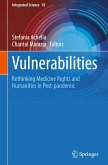Drawing from a wide array of disciplinary perspectives and geographical contexts, this volume offers new insights for critically engaging with the problem of vulnerability. The essays here contained take the move from the COVID-19 pandemic, in order to explore the inherent vulnerability of individuals, but also of social, economic and political systems, and probe the descriptive and prescriptive import of the concept.Each chapter provides a self-contained perspective on vulnerability, as well as a specific methodological framework for questioning its meaning. Taken together, the chapters combine into a multi-disciplinary toolkit for approaching the various forms and structures of vulnerability, with a special attention to the intersectional factors shaping the individual experience of it: from gender to age, from disability to mental illness, from hospitalisation to incarceration. The book explores the theoretical richness and complexity of the concept and proposes new analyticalapproaches to it, before illustrating its multifariousness through empirically grounded case studies. The closing section engages with "the future of vulnerability", as a hermeneutic, epistemological, and critical-normative perspective to be deployed beyond the domain of global crises and emergencies.The volume is primarily intended as a reference for scholars in the human, social and health sciences. The accessible structure and plain language of the chapters make it also a valuable didactic resource for graduate courses in philosophy, the social sciences and public health.
Bitte wählen Sie Ihr Anliegen aus.
Rechnungen
Retourenschein anfordern
Bestellstatus
Storno








